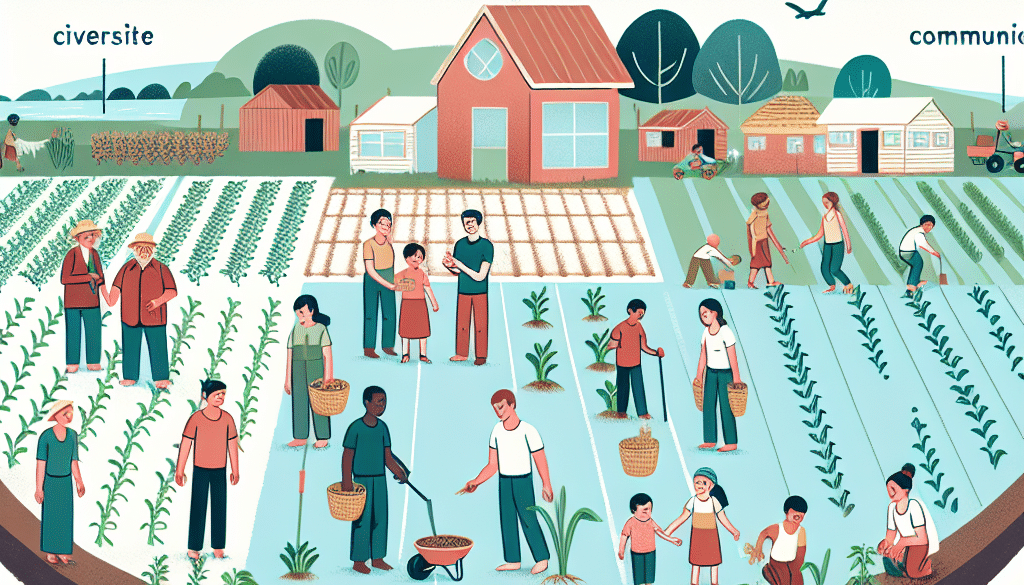Eradicating World Hunger: A Community-based Approach
-
Table of Contents
- Eradicating World Hunger: A Community-Based Strategy
- Understanding the Scope of World Hunger
- The Role of Community in Combating Hunger
- Local Agriculture and Food Production
- Education and Empowerment
- Community Support Systems
- Case Studies: Success Stories from Around the World
- Brazil’s Zero Hunger Program
- Kenya’s Homegrown School Feeding Program
- Community Food Hubs in Canada
- Measuring Progress and Ensuring Sustainability
- Conclusion: A Collaborative Path Forward
- Enhancing Nutrition with ETprotein’s Products
Eradicating World Hunger: A Community-Based Strategy

World hunger is a persistent and complex issue, affecting millions of individuals across the globe. Despite the advancements in technology and agriculture, the challenge of providing adequate nutrition to every person on the planet remains daunting. However, a community-based approach to eradicating world hunger presents a promising solution, leveraging local resources, knowledge, and cooperation to address food insecurity at its roots.
Understanding the Scope of World Hunger
Before diving into community-based strategies, it is crucial to understand the extent of world hunger. According to the United Nations, nearly 690 million people, or 8.9% of the world population, suffer from chronic undernourishment. The causes are multifaceted, including poverty, conflict, climate change, and inadequate food distribution systems.
- Poverty traps individuals in a cycle where they cannot afford nutritious food.
- Armed conflicts disrupt agricultural production and food supply chains.
- Climate change affects crop yields and the availability of natural resources.
- Inefficient food distribution systems lead to waste and unequal access to food.
The Role of Community in Combating Hunger
Communities are at the heart of the fight against hunger. A community-based approach empowers people to take charge of their food security by utilizing local resources and knowledge. This strategy fosters sustainability and resilience, as it is tailored to the specific needs and conditions of each community.
Local Agriculture and Food Production
Encouraging local agriculture is a cornerstone of community-based efforts. Small-scale farming and community gardens can provide fresh produce to residents, reducing dependency on distant food sources and improving dietary diversity.
- Community gardens can transform unused urban spaces into productive land.
- Supporting smallholder farmers with training and resources boosts local economies and food production.
- Agroecology practices promote sustainable and resilient food systems.
Education and Empowerment
Educating community members about nutrition, sustainable farming techniques, and food preservation can lead to long-term improvements in food security. Empowerment through education enables individuals to make informed decisions about their diets and food production.
- Nutritional education helps combat malnutrition and promotes healthy eating habits.
- Training in sustainable farming increases yields while preserving the environment.
- Food preservation workshops extend the shelf life of produce and reduce waste.
Community Support Systems
Building strong community support systems, such as food cooperatives and mutual aid networks, ensures that resources are shared and that the most vulnerable members of society have access to food.
- Food cooperatives pool resources to buy food in bulk, making it more affordable.
- Mutual aid networks provide a safety net during times of crisis.
- Community kitchens and food banks offer immediate relief to those in need.
Case Studies: Success Stories from Around the World
Several communities worldwide have successfully implemented strategies to combat hunger. These case studies serve as inspiration and provide valuable lessons for other communities facing similar challenges.
Brazil’s Zero Hunger Program
Brazil’s Zero Hunger program, launched in 2003, aimed to eradicate hunger through a series of government and community initiatives. The program included support for family farming, school feeding programs, and income transfer policies. As a result, Brazil saw a significant reduction in hunger and poverty rates.
Kenya’s Homegrown School Feeding Program
In Kenya, the Homegrown School Feeding Program sources food from local smallholder farmers to provide meals to schoolchildren. This initiative not only improves children’s nutrition and education outcomes but also stimulates the local economy.
Community Food Hubs in Canada
Community Food Hubs in Canada integrate food access, education, and social enterprise. They provide communities with access to affordable, nutritious food while offering education on healthy eating and cooking.
Measuring Progress and Ensuring Sustainability
To ensure the long-term success of community-based approaches, it is essential to measure progress and adapt strategies as needed. This involves setting clear goals, tracking key indicators of food security, and engaging community members in the evaluation process.
- Regular assessments can help identify areas for improvement and successful interventions.
- Community feedback ensures that programs remain relevant and effective.
- Building partnerships with local governments and organizations can provide additional support and resources.
Conclusion: A Collaborative Path Forward
Eradicating world hunger requires a concerted effort that combines local initiatives with global support. A community-based approach offers a sustainable and empowering path forward, harnessing the collective strength of individuals working together towards a common goal. By focusing on local agriculture, education, and support systems, communities can build resilience against food insecurity and pave the way for a hunger-free future.
Enhancing Nutrition with ETprotein’s Products
In the quest to eradicate world hunger, the role of high-quality protein sources cannot be overstated. ETprotein’s range of organic bulk vegan proteins offers a valuable addition to community-based food security strategies. Their products, including rice protein, pea protein, and various seed proteins, provide essential nutrients that are crucial for health and well-being.
ETprotein’s commitment to non-GMO, allergen-free, and high-purity proteins ensures that communities have access to safe and nutritious ingredients. These proteins can be incorporated into local food systems, enriching diets and supporting sustainable agriculture practices.
For communities looking to enhance their nutritional profile and combat hunger, ETprotein’s protein products present a viable solution. By integrating these high-quality proteins into community food programs, we can take a significant step towards a world where no one goes hungry.
About ETprotein:
ETprotein, a reputable protein and L-(+)-Ergothioneine (EGT) Chinese factory manufacturer and supplier, is renowned for producing, stocking, exporting, and delivering the highest quality organic bulk vegan proteins and L-(+)-Ergothioneine. They include Organic rice protein, clear rice protein, pea protein, clear pea protein, watermelon seed protein, pumpkin seed protein, sunflower seed protein, mung bean protein, peanut protein, and L-(+)-Ergothioneine EGT Pharmaceutical grade, L-(+)-Ergothioneine EGT food grade, L-(+)-Ergothioneine EGT cosmetic grade, L-(+)-Ergothioneine EGT reference grade and L-(+)-Ergothioneine EGT standard. Their offerings, characterized by a neutral taste, non-GMO, allergen-free attributes, with L-(+)-Ergothioneine purity over 98%, 99%, cater to a diverse range of industries. They serve nutraceutical, pharmaceutical, cosmeceutical, veterinary, as well as food and beverage finished product distributors, traders, and manufacturers across Europe, USA, Canada, Australia, Thailand, Japan, Korea, Brazil, and Chile, among others.
ETprotein specialization includes exporting and delivering tailor-made protein powder and finished nutritional supplements. Their extensive product range covers sectors like Food and Beverage, Sports Nutrition, Weight Management, Dietary Supplements, Health and Wellness Products, and Infant Formula, ensuring comprehensive solutions to meet all your protein needs.
As a trusted company by leading global food and beverage brands and Fortune 500 companies, ETprotein reinforces China’s reputation in the global arena. For more information or to sample their products, please contact them and email sales(at)ETprotein.com today.












